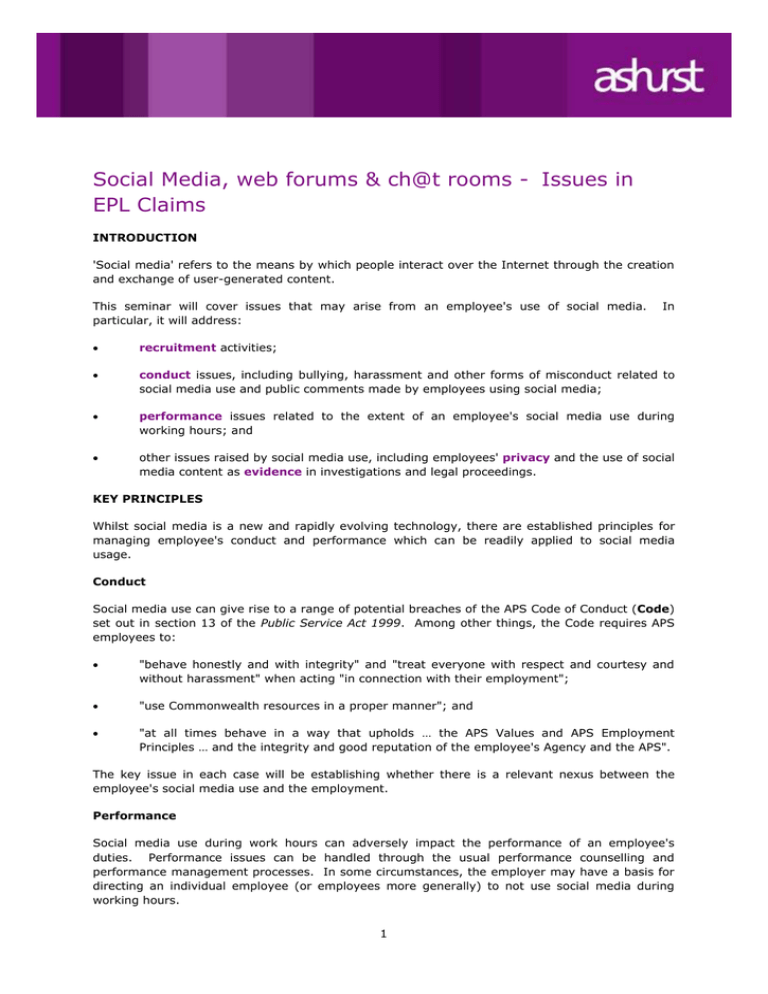Social Media, web forums & ch@t rooms - Issues in EPL Claims
advertisement

Social Media, web forums & ch@t rooms - Issues in EPL Claims INTRODUCTION 'Social media' refers to the means by which people interact over the Internet through the creation and exchange of user-generated content. This seminar will cover issues that may arise from an employee's use of social media. particular, it will address: In recruitment activities; conduct issues, including bullying, harassment and other forms of misconduct related to social media use and public comments made by employees using social media; performance issues related to the extent of an employee's social media use during working hours; and other issues raised by social media use, including employees' privacy and the use of social media content as evidence in investigations and legal proceedings. KEY PRINCIPLES Whilst social media is a new and rapidly evolving technology, there are established principles for managing employee's conduct and performance which can be readily applied to social media usage. Conduct Social media use can give rise to a range of potential breaches of the APS Code of Conduct (Code) set out in section 13 of the Public Service Act 1999. Among other things, the Code requires APS employees to: "behave honestly and with integrity" and "treat everyone with respect and courtesy and without harassment" when acting "in connection with their employment"; "use Commonwealth resources in a proper manner"; and "at all times behave in a way that upholds … the APS Values and APS Employment Principles … and the integrity and good reputation of the employee's Agency and the APS". The key issue in each case will be establishing whether there is a relevant nexus between the employee's social media use and the employment. Performance Social media use during work hours can adversely impact the performance of an employee's duties. Performance issues can be handled through the usual performance counselling and performance management processes. In some circumstances, the employer may have a basis for directing an individual employee (or employees more generally) to not use social media during working hours. 1 POTENTIAL CLAIMS Where an employer takes action (or fails to take action) in relation to an employee's social media usage, there is the potential for the employee to make various types of claims, including: lodging a discrimination complaint under anti-discrimination legislation or a general protections disputes under the Fair Work Act 2009; lodging an unfair dismissal claim in respect of dismissal from employment because of the employee's social media usage; lodging a workers' compensation claim (for injuries caused by bullying or harassing behaviour by other employees on social media); from 1 January 2014, an application to the Fair Work Commission for an order to stop bullying (which is occurring through social media); and a complaint under Work, Health and Safety legislation (regarding bullying or harassing behaviour by other employees on social media). Risk mitigation This seminar will consider the following strategies for reducing the risk of EPL claims arising from social media use: developing and implementing a clear and comprehensive social media policy, which is consistent with other relevant employment policies; and providing employees and managers with training to ensure they understand the risks associated with social media use, particularly with respect to a person's employment. OTHER MATTERS Evidence gathered from social media Recently, there have been a number of cases before courts and tribunals where: an employer has relied upon social media content as documentary evidence of an employee's alleged misconduct; and an employer or employee have relied upon social media content as evidence of key facts in issue (for example, the use of a Facebook post to establish an employee's state of mind at a particular time or the use of a person's LinkedIn account to establish the person's understanding that she was engaged as an independent contractor rather than as an employee). Agencies should carefully consider the circumstances in which it may be appropriate to source evidence from employee's social media. Privacy There have been a number of concerns raised by employees regarding employers accessing and using social media content generated by employees or others. To the extent that social media content contains personal information, employers need to act carefully to ensure they comply with their privacy obligations. ASHURST AUSTRALIA 23 October 2013 2 AUSTRALIA\RJPA\226976421.01
